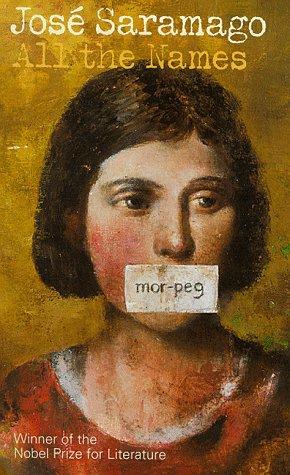José Saramago: All the Names

Although José Saramago appears to be quite popular, I consider All the Names to be one of his lesser-known works. I have several acquaintances who read Blindness, or The Gospel According to Jesus Christ, but relatively few who read All the Names. But as it happens to be one of my favourite novels (not only by Saramago, but generally and all-time) and I reread it every two or three years, I hope I might promote this wonderful book with this blog post.
All the Names tells the story of Senhor José, a fifty-something, indistinct employee of the Central Registry of Births, Marriages and Deaths who lives alone in a small house attached to the side of his office building, which has a half-forgotten door leading directly into the office. Senhor José leads an uneventful life, but he has one innocent hobby which one day changes everything. Senhor José collects newspaper clippings and biographical data concerning the most famous people of his country, and he likes to take advantage of the unique position of his flat, and steal into the office during the night to find and copy the exact biographical information pertaining to the famous people in his collection.
One night, however, he happens to grab the papers of an obscure woman together with the papers of the famous people, and he is at once seized by a philosophical hunting instinct. Although he never used to be a person prone to useless, metaphysical musings, a strange sensation overcomes him now, and he starts pondering about the unknown woman. He realizes that the life of the woman is in fact no different and no less interesting than the life of any arbitrary TV star, sportsman or bishop who are only famous because of the momentary whim of their fans or their flock. Consequently, argues Senhor José, the unknown woman deserves just as much attention as any world-famous personality. Senhor José therefore decides to find the woman – albeit it’s not at all clear for him why he wants to do so. The rest of the novel is the story of his search for the woman. During the search, he is greatly assisted by his strict, sarcastic boss, and he meets several people who sometimes help him and other times hinder him in his undertaking – an undertaking which ends in quite an unusual way.
I try to find a good way to sum up what makes All the Names such an exquisite novel, but it’s not easy, as I feel that the overall effect of the book is much too subtle to be put into simple words. First if all, the story of the novel is a very good one: it’s the archetypal story of a search, and as such, it abounds in symbols and allusions. We have a labyrinth here with the corresponding Ariadne thread, several obstacles to overcome, and a fearless detective, Senhor José. Apart from all these, the novel also features absurd elements (such as the graveyard scene, of which I will not tell you anything as it’s one of the most entertaining and philosophical episode in the novel and I don’t want to spoil your pleasure), and these go nicely hand in hand with the trivial details of the everyday life of Senhor José – and the way the incredible and the bluntly uninteresting details are mixed provides the novel with a unique flavor.
Then of course I must mention Saramago’s style and language usage. The story is told by an invisible, omnipresent, omnipotent and exceedinly ironic narrator, who, during the course of actions frequently engages in conversation with Senhor José. In these conversations he either provides Senhor José with instructions as to the best ways to conduct his search, scorns him for the mistakes he made, or simply talks to him about the theories of life and death. I consider these philosophical conversations the best parts of the novel, as they also make me think about topics such as what makes a person alive or dead.
For those of you who aren’t yet familiar with José Saramago, I have to add that his language usage can be a wee bit distracting or frustrating at first, as instead of inverted commas, he only uses capital letters to indicate that a dialog is going on, moreover, he lets his sentences and paragraphs flow through the pages with hardly any breaks. This way every chapter seems to be a long, curvy, boundless river in which it’s easy to get lost. However, once you get the rhythm, the text is immensely enjoyable, and just as before, I could hardly tear myself apart from the novel.
But even if it might be somewhat difficult to grasp the meaning of Saramago’s long, periodic-style sentences, reading the novel would still worth the effort, if only for the pleasure of the perfect, epiphanic last couple of paragraphs. Saramago has a unique talent for writing unforgettable story endings. I remember I had the same sensation earlier, while reading one of his other novels, Baltasar and Blimunda. The final paragraphs were so overwhelming, creepy and enthralling that I wouldn’t have regretted reading the whole novel if there hadn’t been any other sources of pleasure in it, only those magnificent sentences in the end. And it’s just the same with All the Names: though it’s immensely beautiful and enjoyable from the very first page, the last paragraphs make it even more perfect for me.





